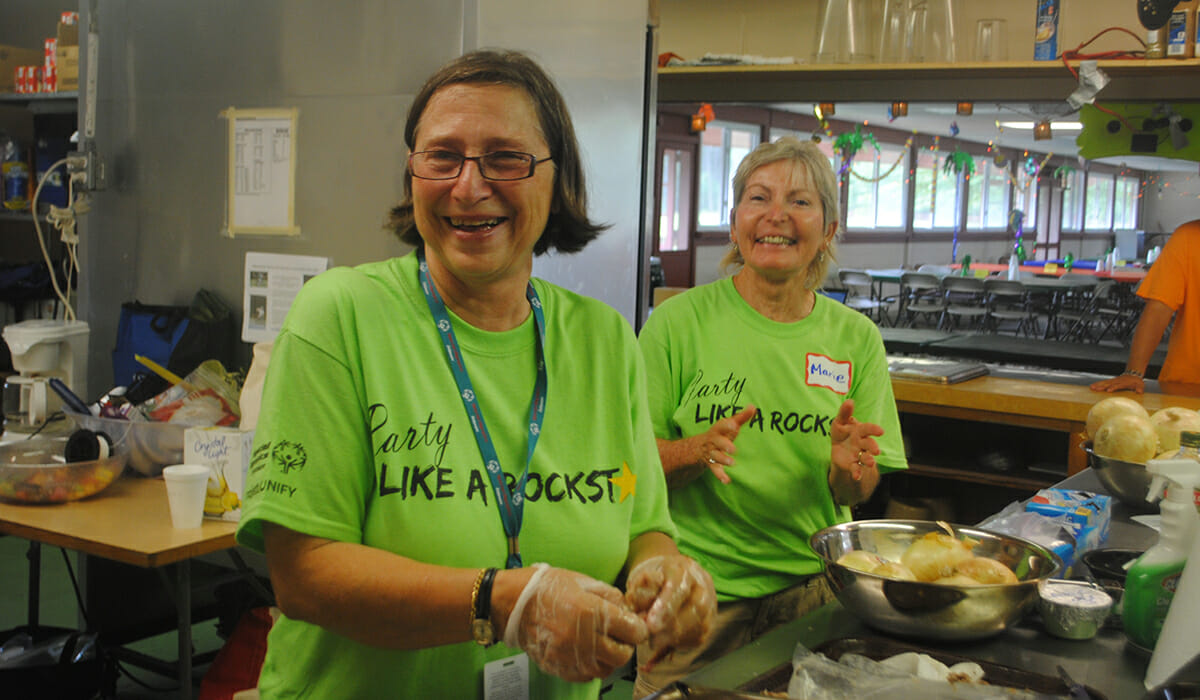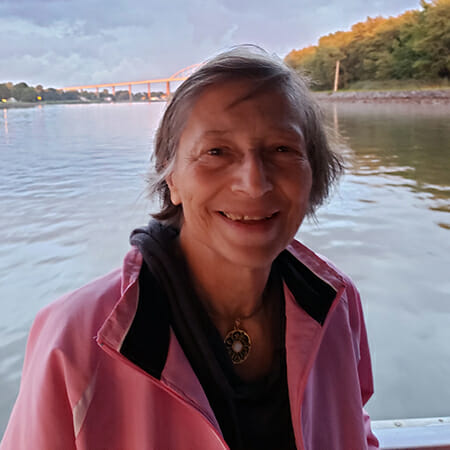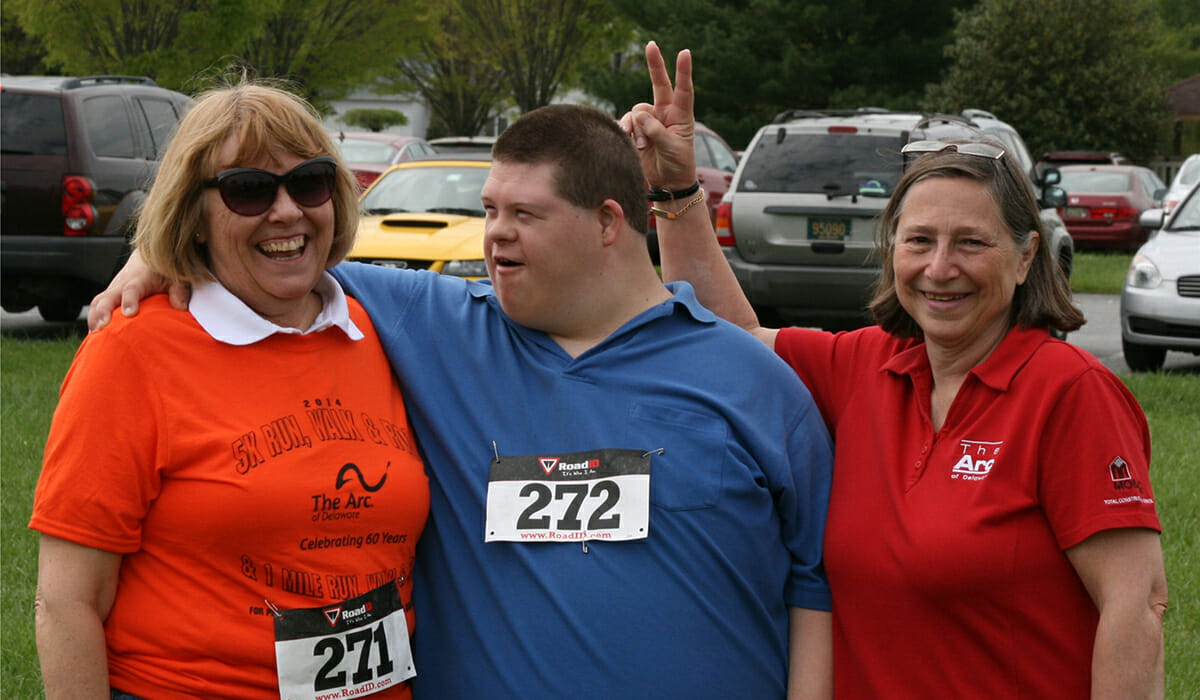Special Olympics Volunteer Dedicates Over 30 Years of Service to Organization

Meet Daily Point of Light honoree Merry Jones. Read her story and nominate an outstanding volunteer or family as a Daily Point of Light.
When Merry Jones first tried to get her daughter Kim, who was born with Down Syndrome, involved in Special Olympics as a child, little did she know that she was leading herself down a path of volunteering with the organization for over 30 years, as well as leading a life of service through volunteering with other nonprofits as well.
The mother of three had only been trying to get a Special Olympics gymnastics team started at Kim’s school, because she herself had been a gymnast in high school. While Kim’s teacher was eager to help start the team, she wasn’t familiar with the sport and asked Merry to help her coach. Saying ‘yes’ led to Merry becoming a lifelong volunteer with Special Olympics Delaware, which offers training and competition in over 20 sports to athletes with intellectual disabilities. Throughout the years, Merry has coached bowling, served as an assistant or helped start several other sports, and is currently the tennis director and coach, as well as the registration manager for her community team, the Kent Wildcats.
Aside from Special Olympics, Merry has also spent almost two decades volunteering for The Arc of Delaware, a statewide nonprofit that advocates for those with intellectual and development disabilities and their families. She is currently on the Board of Directors and serves as President of the MidDel committee, and has also been Board Vice President in the past. Merry does this all while living with breast cancer, which metastasized in 2015. When she’s not volunteering for Special Olympics or The Arc, she offers her additional time to helping out the Delaware Breast Cancer Coalition and the Cancer Support Community Delaware.
Describe your volunteer role with Special Olympics Delaware.
I’ve had many over the years, but currently I am our registration manager for the Kent Wildcats, which is the community team that’s in central Delaware. I am also the tennis director for our team and the tennis coach.
[As registration manager], I’m responsible for making sure everybody has their physicals up to date and on time. Whenever a sport starts — and there are a number of sports currently, we just started the bowling season — before anybody can practice or be on the team to begin with, you have to have a current physical. Special Olympics has requirements that you have to attend 80 percent of the practices, but you also have to be current, so if you don’t have a current physicals you can’t practice until you get one. Special Olympics sends some of the forms out to everybody but it’s my job to follow up with everybody to make sure they are current, and if not to get them everything they need in order to get them to be current at the time the season starts.
When did you first get involved with Special Olympics?
Last summer with the Summer Games marked my 30th year. I’ve known for a long time that I think my calling on earth is to help other people, and my career was as a speech language pathologist. When my third daughter was born, she was born with Down Syndrome. … I had Kim in a program quite early and when she went to the level 5 school, which is one for those with more severe intellectual and development disabilities — at that time it was a separate school in a segregated-type setting — I was working as a speech pathologist in the district and one of the schools I had was next to hers. When she turned eight, she was eligible to compete in Special Olympics and I had gotten a notification that they were going to start a gymnastics team. That was something I did in high school and I thought maybe I can get in to doing something like that so that I could help her. I contacted her teacher at that time to see if she would be able to start a gymnastics team at Kim’s school, and she was a real go-getter and she said sure I can do that, but I don’t know anything about gymnastics. I said well, I can do the gymnastics part, but I’m not sure I can deal with a large number of those with special needs all at one time. … We set it up to have as an after-school practice and that’s how I got started with it. We both did it, but technically I knew more of the gymnastics moves and that kind of thing to work with the students on, so that’s how I got started.
After a number of years, they did away with [gymnastics] and they added tennis. Tennis was also a sport that my father had taught me years ago, and I hadn’t played it in years but I knew the basics and all of that, so I got Kim started on a tennis team. At that time I wasn’t coaching it, somebody else was, but three coaches later I became a tennis coach. Then we lost our bowling coach after awhile … we needed somebody to coach and I thought well, bowling is one of our biggest sports, I can at least by that time manage the group. And I’m pretty good with paperwork and that kind of stuff, so that’s why I ended up being the registration manager. I just tried to volunteer wherever there was a need, so I took on the bowling coach and I did that for a number of years. Eventually we lost a bocce coach and I got that one started, not as a coach but I was an assistant with a number of the sports and I always did whatever my daughter did. It’s just evolved over the years.

What about Special Olympics made you want to be so involved over decades?
Partly, it’s keeping my daughter active. Special Olympics has afforded her and many other athletes opportunities they may never have had. In her case, it’s not necessarily the sports. She’s not a strong athlete, but she likes being with her friends and doing what they do. It’s not only recreational, it’s also a social experience. She’s had the opportunity to actually train in a sport, compete, get medals. In Delaware, very little of that is of cost to the athlete. It’s absorbed by Special Olympics in Delaware, with the exception of bowling. We get our shoes free, but we pay minimal for games. Special Olympics Delaware has done a number of, over the years, amazing fundraisers so cost is not an issue. They can all compete because we’re such a small state, as long as they participate and put in the required amount of time. They can do an area competition, they can do a full state competition, many of our athletes have gone to nationals. We’ve had a few on our team who have gone to international games and won medals. Many of these kids would not have had the opportunity to do any of that if it weren’t for Special Olympics or our coaches, our volunteers and so forth.
We also have a sports camp called Camp Barnes. It’s run by the state police. They have usually two sessions of camp, three-day camp, where they can go and live in cabins and do camping activities. There’s a pool. The camp is on a creek, and we have volunteers that come in with big pontoon boats, so they can go out on the creek down to the bay in a pontoon boat. They can do archery, arts and crafts, they have campfires, we have a dance, we have a motorcycle club that comes in so they have a chance to sit on a motorcycle and blow the horns and do those kinds of things. It gives all of the individuals the chance to do something they probably never experienced ever before and might have never experienced if it weren’t for Special Olympics.
Describe your volunteer role with The Arc of Delaware.
The Arc of Delaware is another nonprofit and it’s also for those with intellectual and development disabilities. I haven’t been with them as long, I think it was about 2003 when I started with that. It varies a little bit, but I think we own about 83 group homes now. We’re responsible for providing maintenance and the oversight of those homes. I have been on the state Board of Directors for a number of years. I was Vice President a few years ago. I’m not an officer at this point, but I am the president of the MidDel Committee, which is responsible for the Kent and Sussex counties. It’s a statewide nonprofit.
Our major fundraiser down here is a Run, Walk and Roll. It’s a 5k fundraiser. We call it ‘Roll’ because it’s wheelchair-friendly as well as for more able-bodied athletes. This spring we will have done 20 years worth. I’ve been chairman of that for probably the last six or seven years. We have decided that this will be our last year, because pretty much everybody now is doing 5Ks and it’s hard to get people to come out when you can run five or six different ones within the same weekend. This will make 20 years in 2020 and we’re going to call it a celebration of our 20 years and then we’re looking toward other fundraisers that are in the works right now.
We have a strong recreation committee, so we provide nine monthly dances that are free of charge to those who participate. They’re dances for those with intellectual and development disabilities primarily, but families are welcome. There’s no cost to the participants, we have sponsors that provide meals for us, the Arc picks up the cost of the venue. … We’re also trying to get similar dances started in Sussex County and right now we’re doing about three or four a year. Any fundraisers or anything we have, the money funnels back to us to pay for the dances and that for the participants. Those dances, I haven’t been doing them for that long, but they’ve been going on for about 60 years or more, and started out on a small scale. Some of our bigger ones we’re getting between 200, 250-300 people, particularly Christmas and Valentine’s, some of the biggest holidays. We try to have it around a holiday time or holiday theme with decorations. We do provide a family picnic once a year and that’s at one of the local state parks. The Arc provides the meat and beverages. A lot is donated and what isn’t donated we pay for and then each person that comes is asked to bring a dish to share. It’s usually about two and a half hours on a Saturday in the end of September, the first of October. We introduced karaoke night and we’ve only done one but that took off quite well, so I think that’s what we’re going to be doing now in the summer when it’s too hot to be out for the picnic and outdoors things, but we can do karaoke inside.
It’s the same population served by the Arc and Special Olympics. Many of the people I know attend both, they’ll come the dances and they’re also on my team. … It just takes a lot of volunteering on everybody’s part. All of our board members and everything are volunteers. Special Olympics has a minimal amount of paid staff and it’s the same thing with the Arc. We rely on the volunteers to get the actual events up and running and that kind of thing, certainly with help from the central [organization] in both places, but largely it’s run by volunteers.

What’s been the most rewarding part of your work?
I think being around long enough to see athletes that I may have had as four-year-olds when they couldn’t talk and couldn’t do much of anything, and now they’re competing in sports, they’re talking, they’re on their cell phones. Just seeing the growth in everybody over the course of many years and how much they’ve improved in all aspects, even the ones who, similar to my daughter, will never be great athletes but she still has improved phenomenally. It’s taken her a much longer time to do it then a normal athlete would, but she still enjoys it and she’s got quite a collection of medals, that’s for sure. So I think seeing the growth in the athletes not just in the physical, but their communication skills, their social skills, their recreational abilities, all of that.
Why do you think it’s important for others to give back?
I was given a lot. I just feel the need to give back. I’ve gotten way more from it than I’ve ever given. If I have a skill that I can impart to somebody for whatever reason, I think it’s important that we all do it. We all are one. Even though we’re different races, different ethnicities, different religions, whatever it be, we’re still one people and everybody should be treated as one and included as one.
What do you want people to learn from your story?
I know it sounds cliche, but we all need to treat everyone as equals. There’s no difference between any of us. We’re a diverse world and everybody should be treated equally. If we were to treat others as we wish to be treated and include everybody in everything at whatever level they can handle — you learn so much more from the athletes. Nobody has more determination than they do to accomplish something. For some of them, it may be blowing a feather across the table, but they didn’t have breath control before and now they do and maybe that will work into eventually being able to roll the ball or a ping pong ball or something. Advancing everybody’s skills as much as possible, and living in a diverse world where everybody works together for the common good of all of us.
Do you want to make a difference in your community like Merry? Find local volunteer opportunities.
